Ford's top aide, Pat Sackville, likes to keep it private
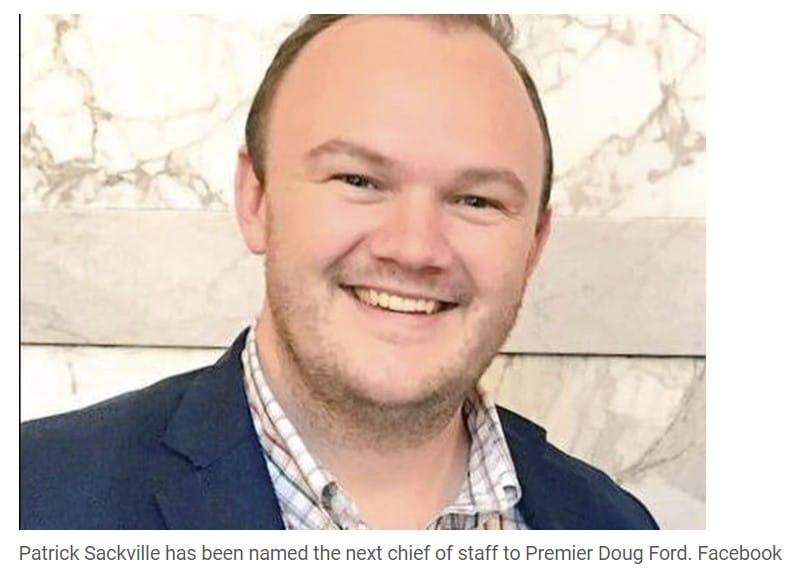
A closer look at Doug Ford's chief of staff, and his lobbying company
Last week, Global News brought Ford’s greenbelt scandal back to the front burner by reporting on Patrick Sackville’s use of private emails.
Sackville, Ford’s chief of staff since 2022 and previously Ford’s principal secretary, had earlier told Ontario’s Integrity Commissioner, David Wake, that he did not conduct government business on his personal email. However, Global viewed dozens of emails sent and received from Sackville’s Gmail account, including documents relating to stakeholder concerns and communications strategies.
Global reported that Sackville’s private email address was used to send and receive emails from MPPs, chiefs of staff, policy advisors, high level staffers and stakeholders. Some of the emails include discussion on confidential government policies before they were publicly announced, and Sackville also shared Google slide decks and Google documents for others to review and collaborate.
Premier Doug Ford confirmed that Sackville had used his private email for government business, but defended his top aide: “As for Patrick Sackville, as far as I am concerned, he did nothing wrong.”
Followers of the Greenbelt scandal will recall that Ryan Amato, chief of staff to former minister of housing (now government house leader) Steve Clark, stepped down after investigations by the auditor general and the integrity commissioner revealed certain “developers” were given preferential treatment and had advance knowledge of which properties would be removed from the greenbelt.
Though both Ford and Sackville had claimed, under oath, to have no involvement in the selection of sites for removal from the greenbelt, Amato sent an email to Sackville (then Ford’s principal secretary) from his private account to Sackville’s private account in October of 2022 that outlined a “list of criteria for removals.” The email, with the subject line “special project - GB”, included what type of location should be considered, what type of infrastructure should exist on the land, and what potential offsets should look like.
This email, according to Sackville, was “overlooked”, which is why it had not been provided during the Ontario integrity commissioner’s investigation. In a letter to NDP leader, Marit Stiles, integrity commissioner, David Wake, wrote that after discovering the email he concluded that a review into the matter would be “unnecessary.”
Wake said he accepted Sackville’s explanation as to why the email had not been supplied to him. Sackville’s explanation was that he had not seen the email because it was sent to his personal email address. Wake accepted this premise, despite the fact Sackville clearly used his private email for government business, and despite the fact that the contents of the email seem to directly contradict what Sackville told the integrity commissioner during the investigation in 2023.
"I have concluded that the Oct. 17 email sent from Mr. Amato to Mr. Sackville's personal email in the circumstances I have outlined does not support a finding that Patrick Sackville knew about the specific removal criteria for lands from the Greenbelt or the properties selected for removal until he was briefed with others, as he testified, on Oct. 27," wrote Wake.
Despite being investigated by the integrity commissioner last year, Sackville was the recipient of a very significant raise. According to the Sunshine List, Sackville received a 74% raise in 2023, taking his salary as Ford’s chief of staff from $186,667 to $324,675. (For sake of comparison, the Ford government’s Bill 124, passed at the end of 2019, imposed a 1% cap on compensation increases for all public sector workers for three years.)
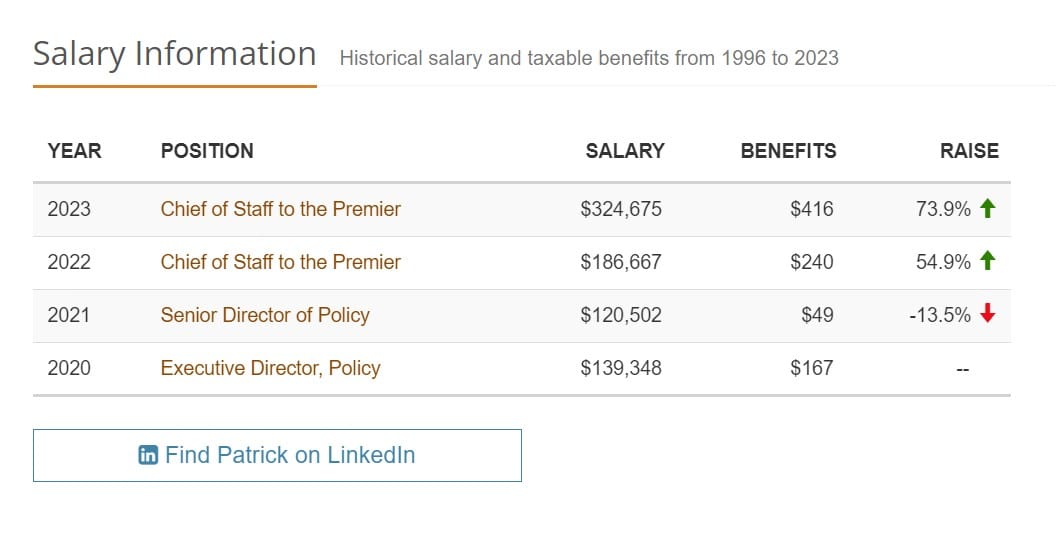
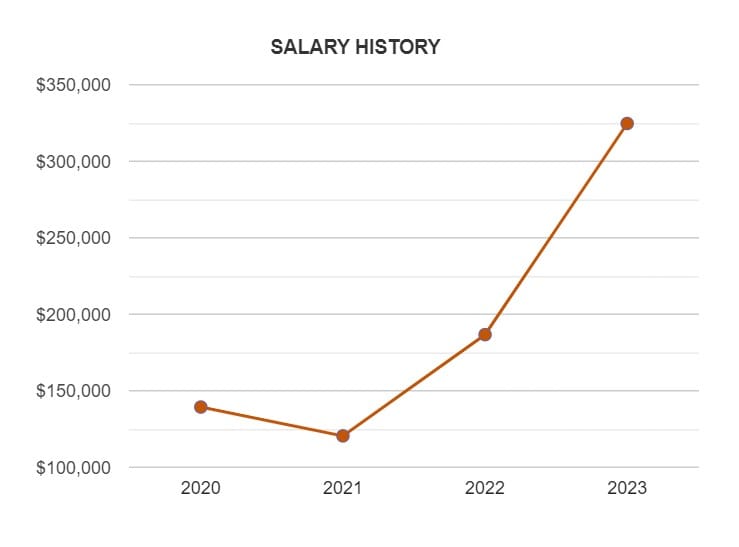
Recent coverage of Pat Sackville and his relationship with Doug Ford has failed to mention Sackville’s company, Blackridge Strategy. In April of 2018, just months before Ford became premier, Blackridge was registered as a business in London, Ontario by Sackville; failed London city council candidate; Amir Farahi; and Thames Valley District School Board trustee, Jake Skinner.
Marketed as a “public affairs consulting company”, Blackridge was hired by at least 12 city council and school board trustee candidates during the 2018 civic election.
Blackridge was behind controversial anonymous attack websites against two female city council candidates, Maureen Cassidy and Virginia Ridley. The websites, with associated Facebook pages, made negative claims about the women’s parenting, sexual history and voting records, calling them “greedy” and “irresponsible”.
Farahi, co-owner of Blackridge, initially fiercely denied that the company had any role in the smear websites. However, under orders from a Superior Court judge, Blackridge was required to reveal who paid for the smear sites, and turned over documents which showed the company worked for candidates challenging both Cassidy and Ridley. Those documents also showed the sites were registered and paid for by Farahi.
Following the 2018 provincial election, Blackridge was retained by the Middlesex-London Health Unit to lobby the Ford government to fund the city’s supervised drug consumption site. Blackridge was paid about $6,300 to advocate for funding, help create a business case for the permanent site, and to get Medical Officer of Health, Dr. Chris Mackie, on the provincial consultation committee looking at supervised consumption sites. The health unit received an invoice from Blackridge for the work in August 2018.

In April of 2019, while Sackville was working for Ford, Blackridge registered as a lobbyist against the health unit’s plans for the supervised consumption site. Drewlo Holdings, which develops, constructs and manages apartment buildings, retained Blackridge to get the site moved to another location and, in June of 2019, the province rejected funding for the site. A written statement from the Minister of Health and Long-Term Care said the location was “being contested at the municipal level.” Allan Drewlo, president of Drewlo Holdings, had publicly endorsed Doug Ford in 2018 and again in 2022.
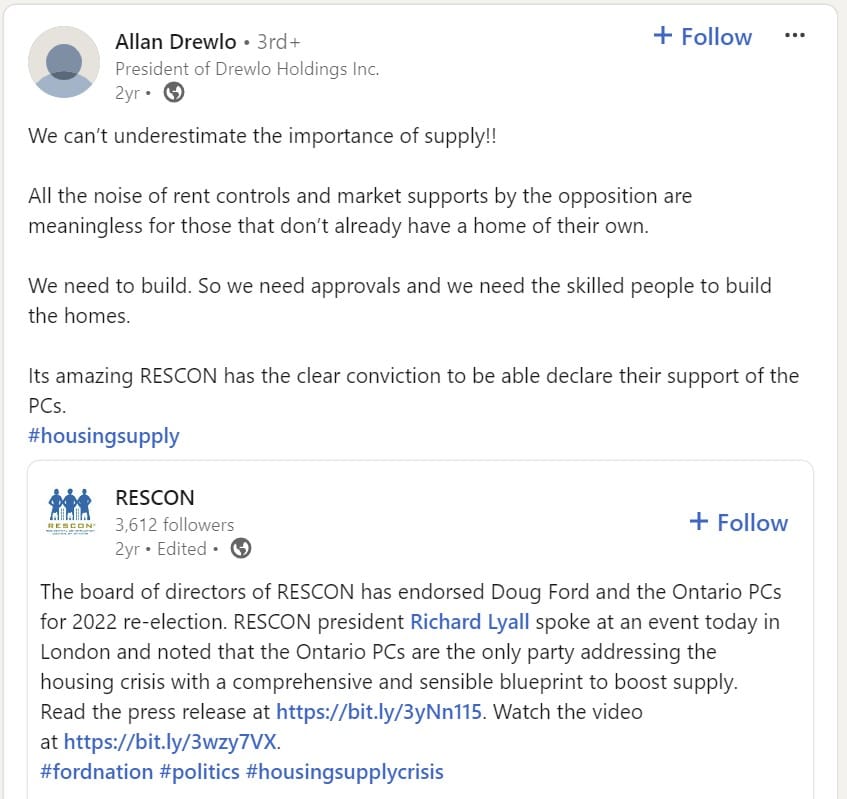
By June of 2019, the London issue hit Queen’s Park. NDP MPP for London North Centre, Terence Kernaghan, accused Ford’s office of “cutting deals in back rooms” to block the long-planned supervised consumption site.
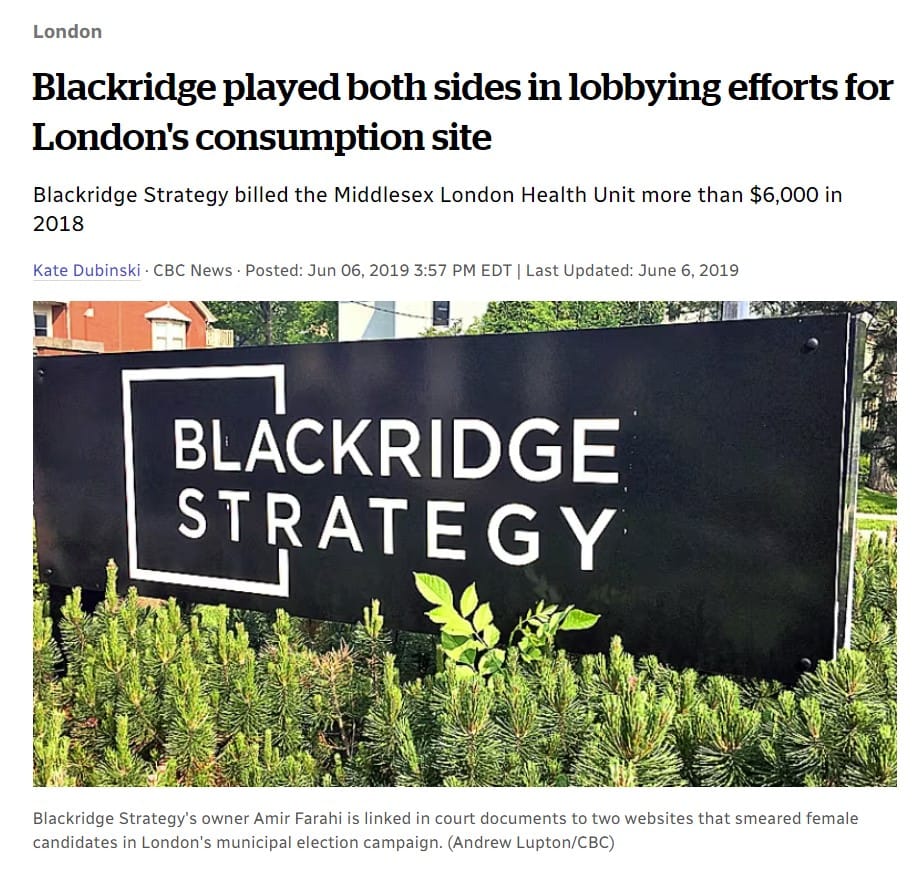
“There are deep connections between Blackridge and the premier’s own office staff. Lobbyists pushed to have the York Street site cancelled, and sure enough, that’s what happened. This is another example of the premier cutting deals in backrooms and meddling in municipal affairs while vulnerable people pay the price.”
Team Ford has enthusiastically joined other conservative premiers in their attacks on safe supply, supervised consumption sites, and drug users in general, in a show of political and philosophical unity. A number of safe consumption sites in Ontario have closed or reduced availability due to lack of funding, despite overdose deaths reaching a crescendo since the pandemic.
Last October, the Ontario government used a shooting outside a clinic in Toronto as pretence to pause all approvals on new supervised consumption and treatment sites and launch a “review” of existing sites. (The stray bullet that killed 44 year old Karolina Huebner-Makurat was, according to police, fired in the course of a robbery at a nearby intersection, unrelated to the consumption site.)
In May of this year, Ford requested that Ottawa stop approving new safe supply sites, as well as launch a review of existing sites. A day later, Ford’s minister of health and solicitor general warned Toronto Public Health to drop its bid to decriminalize drugs for personal use in the city.
In an interview on 680 News, Ford called Toronto Public Health’s plan “the craziest thing I’ve ever heard”, despite being supported by Toronto Police Service and the chief of police. In the same interview, the former hash dealer dropped a hint about his motivation. In a province that is rapidly privatizing healthcare services, waitlists for public addiction services can be years long. Privately-owned clinics, growing in number across the province, charge clients tens of thousands for addiction help and support.
“These people need to go to a treatment centre. Putting a safe injection site into a community — what does it attract? It attracts drug dealers. It’s unacceptable. I do care about the community, number one. I care about someone who is addicted to drugs, that they need to go get proper treatment.”
Dear subscribers, we’ve had questions as to whether Corruptario can be found on social media. Those who followed us on Twitter know we’ve had a rough ride with social media platforms, having been permanently suspended from both Twitter and Facebook. But, thanks to your enthusiasm, we’re going to give it another shot. Please follow us if you use any of these social networks.
Jordan is on Facebook, and new articles are posted on his profile. Jordan is on Bluesky and LinkedIn too.
You can find Morgan and her caustic wit on Twitter, and we also post new articles on the Corruptario Twitter account.
Finally, we’re posting all new content on Mastodon as well.
Thanks, as always, for your interest and support!
Corruptario is a reader-supported publication. To receive new posts and support our work, consider becoming a free or paid subscriber. If you find this work valuable, you can leave us a tip!
